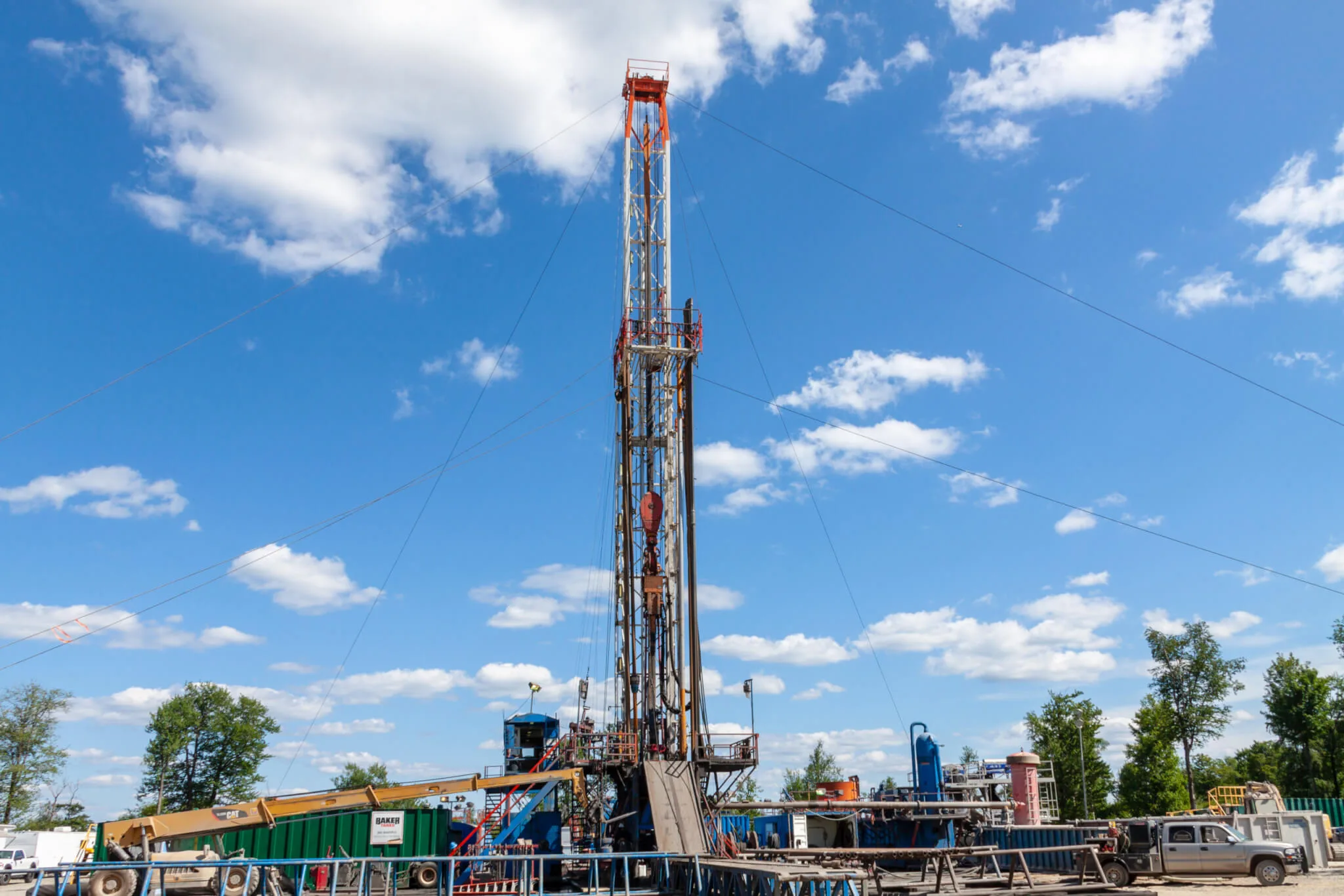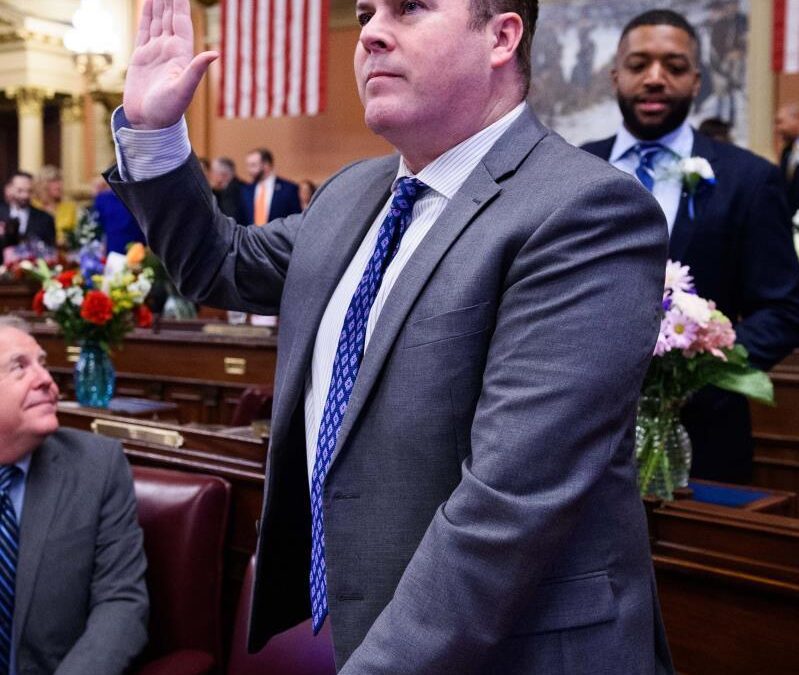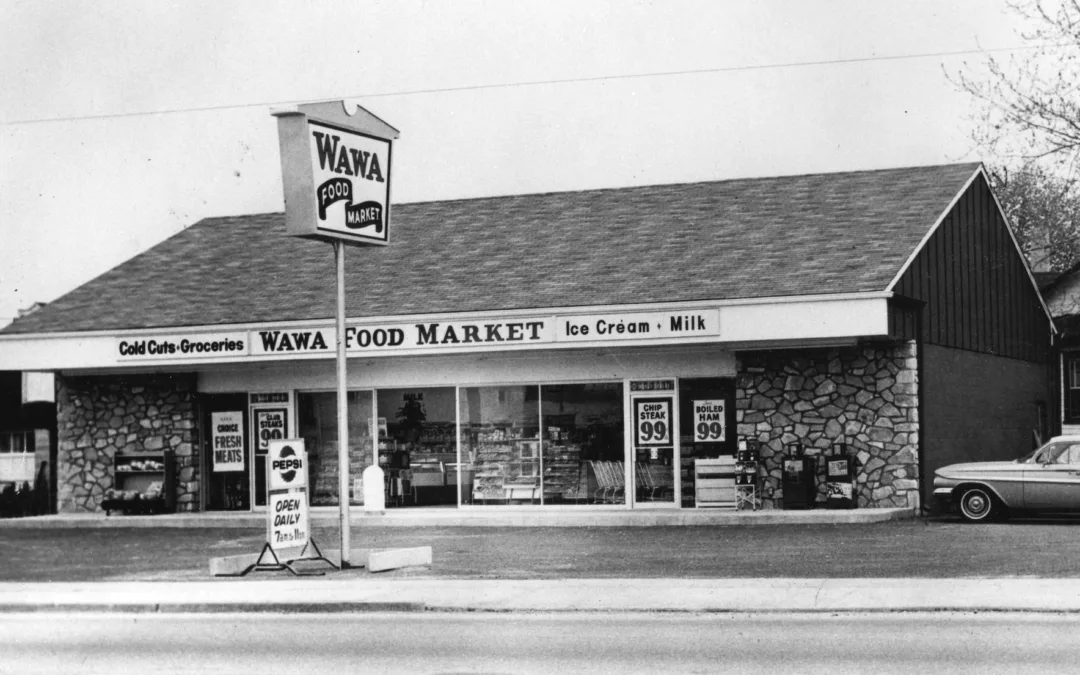
Marcellus Shale Gas Drilling Rig during construction of a well in Northern Pennsylvania. Image via Shutterstock
The bill comes on the heels of a grand jury report that determined children in the state had been sickened by polluted air and water near the fracking industry’s drilling sites.
Earlier this summer, a Pennsylvania grand jury released an investigative report highlighting how the fracking industry in the state was responsible for polluting the air and water near its drilling sites and sickening Pennsylvanians, including children.
State residents told the grand jury that fracking—a technique in which a mix of water, sand, and chemicals is injected deep underground at high pressure to extract natural gas or oil, and has been shown to contaminate groundwater and drinking water—changed the color and smell of their water.
Grand jurors also heard testimony of small children waking up with severe nosebleeds, Pennsylvania Attorney General Josh Shapiro said during a press conference last month. “One parent testified that her 4-year-old daughter was waking up crying with blood pouring out of her nose.”
Despite these consequential findings, lawmakers in the GOP-led legislature this month handed a huge gift to the natural gas industry by passing a bill that will provide it with a $670 million tax break.
Members of the state House and Senate hope the bill will help attract petrochemical and fertilizer plants to the state with subsidies spread out over the next 25 years, creating thousands of new jobs.
Environmental advocates blasted the legislation, questioning the wisdom of giving away taxpayer dollars to a declining industry amid a global health pandemic and the worst economic collapse in nearly a century. They argue that money should have instead been used to create jobs in renewable energies—like solar or wind—that are on the upswing and don’t emit fossil fuels that contribute to an increasingly unstable climate.
Pennsylvania lawmakers have “put into law their vision for Pennsylvania’s future—dirty air and water choking our communities, extreme weather caused by climate change, and towns and cities beholden yet again to another economically unviable, polluting fossil fuel industry for the promise of jobs,” Jacquelyn Bonomo, president and CEO of PennFuture, an environmental group, said in a statement.
‘A Backroom Deal’
House Bill 732 establishes a new tax credit for companies that invest at least $400 million and create at least 800 construction and permanent jobs to build petrochemical or fertilizer plants that use dry natural gas produced in Pennsylvania. No more than four companies can qualify for the credits each year and they can receive up to $6.7 million each.
The bill was originally written as a tax relief measure for volunteer fire departments, but was modified to include the subsidies and passed without public input or hearings, drawing accusations of a “backroom deal.” The proposal was backed by chemical, manufacturing, and natural gas industries, as well as local building trade unions. It cleared the General Assembly by huge margins, earning some Democratic votes as well.
Gov. Tom Wolf, a Democrat, signed the bill on Thursday.
“The legislation is about bringing good-paying jobs and cutting-edge technologies to northeastern Pennsylvania,” Rep. Aaron Kaufer (R-Luzerne), the bill’s sponsor, said in a statement. “It is about ensuring that we will be a manufacturing hub for the foreseeable future.”
In a sign of the industry’s influence over politicians, the bill not only got votes from lawmakers in southwestern and northeastern Pennsylvania, where the bulk of the state’s natural gas production occurs, but garnered support from across the state. Bucks County’s Republican contingent of Reps. Meghan Schroeder, Todd Polinchock, and Wendi Thomas all voted for the bill, as did Harrisburg-area Republican, Rep. Andrew Lewis.
Veronica Coptis, executive director for the Center for Coalfield Justice, said the bill’s passage and widespread support highlighted the industry’s stranglehold in the state. “It has been very clear for a long time that the oil and gas industry has paid and bought themselves a state Senate and state House,” she said.
“It has been very clear for a long time that the oil and gas industry has paid and bought themselves a state Senate and state House.”
According to the report released by the state grand jury in June, the Pennsylvania Department of Environmental Protection was overly cozy with the natural gas industry and failed to protect the public from the health effects of fracking.
Some residents said they were kept awake all night because of constant fracking, and others complained about waste impoundments that “smelled like gasoline and kerosene” and “would overwhelm homeowners with nausea, dizziness, and a feeling that they would pass out.”
Republican lawmakers quickly came to the industry’s defense.
Rep. Cris Dush (R-Indiana), secretary of the environmental resources and energy committee, said he believes there are only a few bad actors to be concerned about, and that those are “very much in the minority.”
PA Is Already Facing Budget Deficits
The decision to push forward on the new subsidy has been met with fierce criticism from environmental advocates, who say it will lead to more pollution of the state’s air and water and increase the likelihood of extreme weather caused by climate change.
Advocates also criticized lawmakers’ decision to give away taxpayer money amid a pandemic that has devastated the state’s budget.
“I think the biggest harm in this particular moment is letting any corporation—not just oil and gas companies but any corporation—out of paying their taxes,” Coptis said. “We’re in a huge budget deficit given the pandemic. It’s irresponsible and immoral to allow any corporation to not pay their fair share to operate in Pennsylvania.”
David Masur, executive director of PennEnvironment, said he was surprised that lawmakers were comfortable giving a tax break to petrochemicals in the middle of a pandemic “where everyday Pennsylvanians can’t pay their mortgage, can’t pay the utility bills, [and] struggle to put food on their tables,” and a time when “we can’t properly prepare our schools to open in a safe way for kids and teachers and families because it’s cost-prohibitive and there’s not a lot of money.”
“I tend to think most voters, if they knew this is what Harrisburg was up to, given those circumstances, would be outraged,” Masur added.
Supporters of fossil fuels argue the industry is essential to the state’s economy and a key source of jobs. Pennsylvania is the nation’s second-largest natural gas producer and the third-largest coal-producing state in the nation.
RELATED: Could A Proposed Fracking Ban Decide the 2020 Presidential Race?
But environmental advocates say that the industry has not been the economic savior that was promised. Poverty rates in southwestern Pennsylvania, the epicenter of the state’s fracking boom, have remained largely unchanged for the past two decades, and the region has seen its population decrease over the years.
These activists also say such tax incentives, which Pennsylvania has previously given to wealthy corporations like Shell, are unnecessary and have not provided a worthwhile return on investment and won’t help the economy long-term because they’re going toward an industry that has been described as being in “terminal decline.”
“Regulations and incentives are not going to stop the decline of a market for fossil fuels. The world is switching to cleaner, renewable energy sources,” Coptis said.
The cost of renewable energy has dropped dramatically in recent years, and more than 160 cities and eight states across the country have already committed to transitioning to 100% renewable energies, according to the Sierra Club. This, Coptis said, means that demand for fossil fuel products will decline, regardless of whether the government provides incentives and subsidies.
Instead of subsidizing the fossil fuel industry, Coptis and Masur want that money directed toward clean energy jobs, which are on the rise in Pennsylvania. In 2019, there were 90,772 clean energy jobs across the state, which is more than twice the number of workers employed in the fossil fuel industry, according to a 2019 report from E2, a national nonpartisan business group.
“These incentives for industry to build here are quick band-aid fixes on our economy that is going to be drastically changing in the next couple of years and our state is hugely failing at creating any plan to ensure that workers.”
Masur also pointed out that “the state has a “moral imperative” to make that transition to clean energy. “We have to solve climate change,” he said.
If we don’t, scientists say that sea levels will rise, extreme heat waves and wildfires will become far more frequent, droughts will increase, floods will become more frequent and heavier, and entire regions will become uninhabitable, displacing up to a billion people—all of which will also devastate America’s future economy.
If legislators really cared about workers like they claim to, Coptis said, they would be dedicating their efforts to creating a plan for the next few decades to guarantee long-term jobs instead of short-term ones.
“These incentives for industry to build here are quick band-aid fixes on our economy that is going to be drastically changing in the next couple of years and our state is hugely failing at creating any plan to ensure that workers aren’t lost and ghost towns aren’t created all across the state once again,” Coptis said. “It happened in the age of coal declining in the 70s and also steel collapsing in the 80s in Pennsylvania. We’re just setting ourselves up for another economic collapse from industry bailing once they can’t profit off of extracting our resources and our labor anymore.”
Politics

Malcolm Kenyatta makes history after winning primary for Pa. Auditor General
State Rep. Malcolm Kenyatta, who was first elected to the state House in 2018, won the Democratic nomination for Pa. Auditor General and will...

Biden administration bans noncompete clauses for workers
The Federal Trade Commission (FTC) voted on Tuesday to ban noncompete agreements—those pesky clauses that employers often force their workers to...

Philadelphia DA cancels arrest warrant for state Rep. Kevin Boyle on eve of Pa. primary
Philadelphia District Attorney Larry Krasner said a detective had sought the warrant against Boyle, a Democrat whose district includes a section of...
Local News

What do you know about Wawa? 7 fun facts about Pennsylvania’s beloved convenience store
Wawa has 60 years of Pennsylvania roots, and today the commonwealth’s largest private company has more than 1,000 locations along the east coast....

Conjoined twins from Berks County die at age 62
Conjoined twins Lori and George Schappell, who pursued separate careers, interests and relationships during lives that defied medical expectations,...






